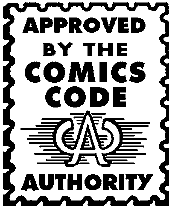In 1950, FBI Director J. Edgar Hoover wrote the committee that despite post-war slacking of juvenile delinquency, the incidence of crime among young people is still “abnormally high.” Hoover asserted that “Eager recruits in an already vast army of youthful offenders are the products of adult negligence—of homes broken by death, desertion, divorce, separation, neglect and immorality.”
According to an article in The Daily Advertiser, “The Senate committee, in publishing its 250-page survey, drew no conclusions of its own. Nor did it attempt to summarize the answers received from questionnaires sent out to probation officers, child welfare workers, juvenile court judge, police and prison authorities, crime comics publishers and others.
“But the prevailing view among the experts was that crime comics and juvenile delinquency have no direct relationship.”
Hoover said the basic cause of delinquency is “the lack of a sense of moral responsibility among youth” and declared that the place to start instilling it is in the family circle.” He also said, “it is doubtful that an appreciable decrease in juvenile delinquency would result if crime comic books of all types were not readily available to children.”
Nonetheless, the concern and debate over the possible connection between the increased crime of teenagers and crime comics continued for a few more years. There were comic book burnings, and municipalities across the nation opted to issue ordinances forbidding the sale of such comics to minors, and others banned them altogether.
The General Federation of Women’s Club was one of many organizations promoting the anti-comic-book campaign. Locally, Mary B. Stewart, president of the Louisiana Federation of Women’s Clubs, led the campaign and worked with other local women’s clubs, including the Women’s Study Club of Bossier City. In 1955, the latter presented a resolution to Bossier City Mayor Burgess McCranie requesting that crime and horror books be banned from the newsstands and stores.
A couple of months later, the Bossier City council passed an ordinance prohibiting the sale of such books to people under the age of 18. Anyone violating any portion of the law could pay up to $100 in fines or 30 days in jail, or both at the court’s discretion. Ironically, the sale and display of such comics had already all but ended since the local distributors were only accepting comic books bearing the Comic Code Seal.
In 1954 televised hearings by the Subcommittee on Juvenile Delinquency of the Senate Judiciary Committee took place. These hearings propagated an unflattering image of comic books and those who made a living off them. This led to the organization of the Comics Magazine Association of America. They formed the Comics Code Authority (CCA) as an alternative to government regulation.
Patterned after the film industry’s Hays Code, the CCA allowed comic publishers to self-regulate the content of comic books. Members of this trade association submitted comics to the CCA, which screened them for adherence to its code, then authorized the use of the seal on the cover if the book conformed with the code. The CCA cleaned up the industry. Nearly all comic publishers adopted the code, cleaning up the industry. The code became defunct in 2011.Censorship arising from moral panic is a constant presence in the history of comics and other media. In 1986, the Comic Book Legal Defense Fund was organized. They are a non-profit organization dedicated to protecting the First Amendment rights of the comics art form and its community of retailers, creators, publishers, librarians, and readers. Public Libraries proudly serve as guardians of the people’s freedom to read.
For the past eighty-two years, the Bossier Parish Libraries has proudly provided access to materials, programs, and technologies that enrich, educate, and inspire the residents of this great parish. We celebrate and preserve our democratic society by making available the broadest possible range of viewpoints, opinions, and ideas, so that all individuals have the opportunity to become lifelong learners - informed, literate, educated, and culturally enriched.
By: Amy Robertson



No comments:
Post a Comment